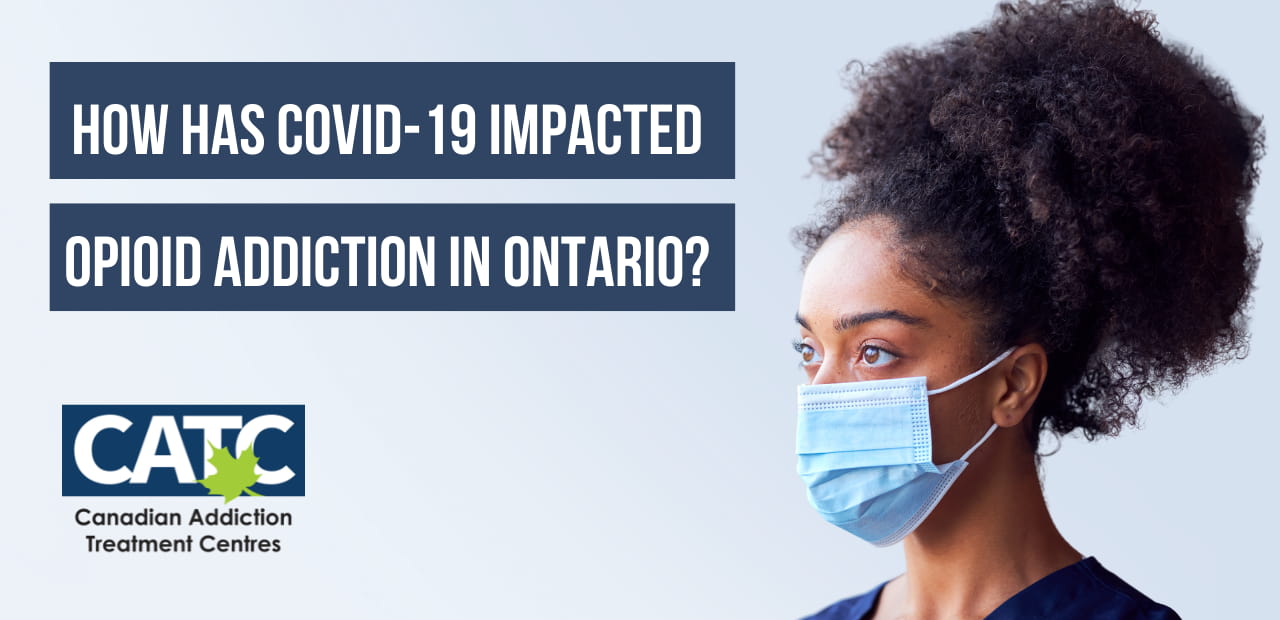How has Covid-19 Impacted Opioid Addiction in Ontario?
How has Covid-19 Impacted Opioid Addiction in Ontario?

Since March of 2020, the rate of opioid overdoses in Ontario, Canada, has increased by 57%. Additionally, opioid fatalities increased by 60% in the same time frame.
These rates increased because access to illicit opioids (fentanyl) surged when the pandemic first began. Ontario had some of the highest lockdown measures during the first wave of the pandemic, causing supply chain disruptions when the borders closed. Some began using opioids due to feelings of anxiety, isolation and stress brought on by the pandemic.
Positive fentanyl drug screenings increased by 108% in people on opioid agonist therapy (OAT). Fentanyl was found to be one of the leading causes of opioid overdose and fatalities. Opioid addiction continues to surge as more people start to experience challenges with their mental health from the prolonged pandemic.
Who Is Affected Most by the Pandemic?
The pandemic has had a different effect on various populations, but certain groups have been hit the hardest by the virus. Marginalized and racialized communities have seen a more significant impact from the pandemic, and these same groups have been hit hardest by the opioid epidemic.
Individuals disproportionately affected by the pandemic and the rise in opioid addiction include:
- Those in rural communities
- Black, indigenous and people of colour (BIPOC) communities
- Those experiencing poverty or homelessness
- Those experiencing incarceration or who have been recently released
Staying home and having limited social interaction has impacted the mental health of an even wider group, and the additional stress brought on by the pandemic has contributed to pandemic fatigue, or a feeling of exhaustion due to the effects of COVID-19.
These groups are also less likely to receive mental health or addiction treatment since many of these services were shut down to prevent the spread of the virus. Researchers have proposed that opioid-related harm during the pandemic can be reduced by increasing access to harm reduction services in high-risk communities and implementing COVID-19 protocols at addiction treatment centres to make treatment safer for patients.
Signs and Symptoms of an Opioid Addiction
Spotting the signs and symptoms of opioid addiction can help you determine if it’s time for your loved one to seek treatment.
If you suspect a loved one is struggling with opioid addiction, there are some signs of opioid use disorder (OUD) you can look out for. Your loved one might have an OUD if they:
- Use opioids for an extended period or more often than planned or prescribed
- Run out of their prescription medication earlier than they should
- Spend a lot of time and effort to obtain opioids
- Experience cravings when they don’t have access to the drug
- Give up activities or passions they once enjoyed
- Make unsuccessful attempts to quit or cut down their use
- Fall behind on responsibilities at home, work or school
- Need more of the drug to have the same effect
- Engage in high-risk behaviours
- Become defensive or angry when the topic of addiction is brought up
If any of these signs are present, you should consider talking with your loved one about seeking treatment.
A person with an opioid addiction will also have physical, mental and behavioural symptoms while experiencing withdrawal. Some of the symptoms include:
- Weight loss
- Muscle aches and cramps
- Headaches
- Nausea or vomiting
- Depression and anxiety
- Confusion or disorientation
- Extreme mood swings and behaviours
- Distorted perception of reality
- Sleep disturbances
- Fatigue
- Slowed breathing
Long-term opioid use can cause various adverse health problems in the heart, kidneys, liver and lungs. Identifying these symptoms in your loved ones and communicating with them can motivate them to seek treatment and prevent further damage to their physical and mental health.
How to Help Someone with an Opioid Addiction During the Pandemic

Some steps you can take to help your loved one include:
- Spend time with them: One of the best ways to support a loved one is to show up and let them know you support them. The pandemic has made spending time with loved ones more challenging, but there are many ways to connect. You can call them regularly to check up on them and plan virtual hangouts where you can engage in activities together, such as watching movies or playing games. Your loved ones will feel less isolated and more supported when you make an effort to connect with them.
- Communicate your feelings: Be honest with your loved ones and communicate how their addiction affects you. Be careful not to blame them for their addiction, and offer your support so they know they can rely on you for help. Avoid making excuses for their behaviour or allowing them to form a co-dependent relationship with you, but let them know that you’re here to help them through the process.
- Help them seek treatment: Communicating with your loved ones can motivate them to seek treatment. If they decide to move forward with treatment, help them find a professional rehabilitation facility that can address their individual needs. Taking this burden off their shoulders or helping them through it can make a huge difference in maintaining their motivation to seek recovery.
- Expect some difficulties: As your loved one progresses through treatment, there will be some challenges. Change won’t happen immediately, and they may relapse, but it’s all a normal part of recovery. Continue to support them, and remain positive.
- Educate yourself: You can help your loved one by educating yourself about opioid addiction, how it affects an individual and what treatment will be like. The more you know about what your loved one is going through, the better you’ll be able to support them.
Learn More About Opioid Addiction Treatment
Find Relief at Canadian Addiction Treatment Centres
The COVID-19 pandemic has been a challenging time for everyone. Those who are struggling with opioid addiction might feel lost or overwhelmed from pandemic-related stress, further contributing to addiction. Canadian Addiction Treatment Centres (CATC) is here to help.
We use evidence-based treatments to improve the lives of our patients and help them reach recovery. We are patient-focused and aim to provide quality care and support. CATC has stepped up to the challenge to battle addiction during this difficult time, and we provide avenues for a safe and successful recovery. Contact us today to learn more about our programs and services.
Resources: